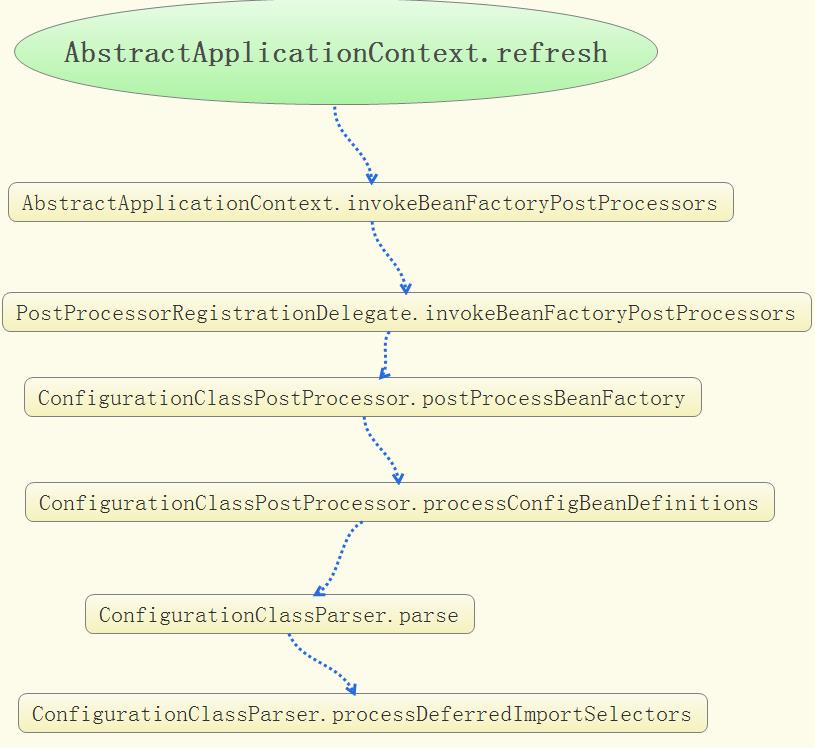Spring之ImportSelector接口
Posted
tags:
篇首语:本文由小常识网(cha138.com)小编为大家整理,主要介绍了Spring之ImportSelector接口相关的知识,希望对你有一定的参考价值。
参考技术A 接口由类型实现,这些类型根据给定的选择标准(通常是一个或多个注释属性)确定应导入哪个@Configuration类。ImportSelector可以实现以下任何感知接口,在selectImports之前将调用它们各自的方法:
EnvironmentAware
BeanFactoryAware
BeanClassLoaderAware
ResourceLoaderAware
或者,该类可以为单个构造函数提供以下一种或多种受支持的参数类型:
Environment
BeanFactory
ClassLoader
ResourceLoader
ImportSelector实现的处理方式通常与常规@Import注释相同,但是,也可以推迟选择导入,直到所有@Configuration类都已处理完毕(有关详细信息,请参阅DeferredImportSelector)。
根据importing@Configuration类的注解元数据,选择并返回应导入的类的名称。
返回:类名,如果没有,则为空数组
这是接口的默认实现方法,返回一个谓词,用于从导入候选对象中排除类,该谓词可传递地应用于通过该选择器的导入找到的所有类。
如果该谓词对于给定的完全限定类名返回true,则该类将不会被视为导入的配置类,从而绕过类文件加载和元数据自省。
返回:传递导入的配置类的完全限定候选类名的筛选器谓词,如果没有,则为null
spring源码分析之@ImportSelector@ImportImportResource工作原理分析
1. @importSelector定义:
/** * Interface to be implemented by types that determine which @{@link Configuration} * class(es) should be imported based on a given selection criteria, usually one or more * annotation attributes. * * <p>An {@link ImportSelector} may implement any of the following * {@link org.springframework.beans.factory.Aware Aware} interfaces, and their respective * methods will be called prior to {@link #selectImports}: * <ul> * <li>{@link org.springframework.context.EnvironmentAware EnvironmentAware}</li> * <li>{@link org.springframework.beans.factory.BeanFactoryAware BeanFactoryAware}</li> * <li>{@link org.springframework.beans.factory.BeanClassLoaderAware BeanClassLoaderAware}</li> * <li>{@link org.springframework.context.ResourceLoaderAware ResourceLoaderAware}</li> * </ul> * * <p>ImportSelectors are usually processed in the same way as regular {@code @Import} * annotations, however, it is also possible to defer selection of imports until all * {@code @Configuration} classes have been processed (see {@link DeferredImportSelector} * for details). * * @author Chris Beams * @since 3.1 * @see DeferredImportSelector * @see Import * @see ImportBeanDefinitionRegistrar * @see Configuration */ public interface ImportSelector { /** * Select and return the names of which class(es) should be imported based on * the {@link AnnotationMetadata} of the importing @{@link Configuration} class. */ String[] selectImports(AnnotationMetadata importingClassMetadata); }
实现线索:

具体代码实现:
private void processDeferredImportSelectors() { List<DeferredImportSelectorHolder> deferredImports = this.deferredImportSelectors; this.deferredImportSelectors = null; Collections.sort(deferredImports, DEFERRED_IMPORT_COMPARATOR); for (DeferredImportSelectorHolder deferredImport : deferredImports) { ConfigurationClass configClass = deferredImport.getConfigurationClass(); try { String[] imports = deferredImport.getImportSelector().selectImports(configClass.getMetadata()); processImports(configClass, asSourceClass(configClass), asSourceClasses(imports), false); } catch (BeanDefinitionStoreException ex) { throw ex; } catch (Throwable ex) { throw new BeanDefinitionStoreException("Failed to process import candidates for configuration class [" + configClass.getMetadata().getClassName() + "]", ex); } } }
2、@Import和@ImportResource的实现如下:
ConfigurationClassParser.java
/** * Apply processing and build a complete {@link ConfigurationClass} by reading the * annotations, members and methods from the source class. This method can be called * multiple times as relevant sources are discovered. * @param configClass the configuration class being build * @param sourceClass a source class * @return the superclass, or {@code null} if none found or previously processed */ protected final SourceClass doProcessConfigurationClass(ConfigurationClass configClass, SourceClass sourceClass) throws IOException { // Recursively process any member (nested) classes first processMemberClasses(configClass, sourceClass); // Process any @PropertySource annotations for (AnnotationAttributes propertySource : AnnotationConfigUtils.attributesForRepeatable( sourceClass.getMetadata(), PropertySources.class, org.springframework.context.annotation.PropertySource.class)) { if (this.environment instanceof ConfigurableEnvironment) { processPropertySource(propertySource); } else { logger.warn("Ignoring @PropertySource annotation on [" + sourceClass.getMetadata().getClassName() + "]. Reason: Environment must implement ConfigurableEnvironment"); } } // Process any @ComponentScan annotations Set<AnnotationAttributes> componentScans = AnnotationConfigUtils.attributesForRepeatable( sourceClass.getMetadata(), ComponentScans.class, ComponentScan.class); if (!componentScans.isEmpty() && !this.conditionEvaluator.shouldSkip(sourceClass.getMetadata(), ConfigurationPhase.REGISTER_BEAN)) { for (AnnotationAttributes componentScan : componentScans) { // The config class is annotated with @ComponentScan -> perform the scan immediately Set<BeanDefinitionHolder> scannedBeanDefinitions = this.componentScanParser.parse(componentScan, sourceClass.getMetadata().getClassName()); // Check the set of scanned definitions for any further config classes and parse recursively if necessary for (BeanDefinitionHolder holder : scannedBeanDefinitions) { if (ConfigurationClassUtils.checkConfigurationClassCandidate(holder.getBeanDefinition(), this.metadataReaderFactory)) { parse(holder.getBeanDefinition().getBeanClassName(), holder.getBeanName()); } } } } // Process any @Import annotations processImports(configClass, sourceClass, getImports(sourceClass), true); // Process any @ImportResource annotations if (sourceClass.getMetadata().isAnnotated(ImportResource.class.getName())) { AnnotationAttributes importResource = AnnotationConfigUtils.attributesFor(sourceClass.getMetadata(), ImportResource.class); String[] resources = importResource.getStringArray("locations"); Class<? extends BeanDefinitionReader> readerClass = importResource.getClass("reader"); for (String resource : resources) { String resolvedResource = this.environment.resolveRequiredPlaceholders(resource); configClass.addImportedResource(resolvedResource, readerClass); } } // Process individual @Bean methods Set<MethodMetadata> beanMethods = sourceClass.getMetadata().getAnnotatedMethods(Bean.class.getName()); for (MethodMetadata methodMetadata : beanMethods) { configClass.addBeanMethod(new BeanMethod(methodMetadata, configClass)); } // Process default methods on interfaces processInterfaces(configClass, sourceClass); // Process superclass, if any if (sourceClass.getMetadata().hasSuperClass()) { String superclass = sourceClass.getMetadata().getSuperClassName(); if (!superclass.startsWith("java") && !this.knownSuperclasses.containsKey(superclass)) { this.knownSuperclasses.put(superclass, configClass); // Superclass found, return its annotation metadata and recurse return sourceClass.getSuperClass(); } } // No superclass -> processing is complete return null; }
3.三种方式:
ImportSelector
ImportBeanDefinitionRegistrar
Configuration
ConfigurationClassParser.java
private void processImports(ConfigurationClass configClass, SourceClass currentSourceClass, Collection<SourceClass> importCandidates, boolean checkForCircularImports) throws IOException { if (importCandidates.isEmpty()) { return; } if (checkForCircularImports && isChainedImportOnStack(configClass)) { this.problemReporter.error(new CircularImportProblem(configClass, this.importStack)); } else { this.importStack.push(configClass); try { for (SourceClass candidate : importCandidates) { if (candidate.isAssignable(ImportSelector.class)) { // Candidate class is an ImportSelector -> delegate to it to determine imports Class<?> candidateClass = candidate.loadClass(); ImportSelector selector = BeanUtils.instantiateClass(candidateClass, ImportSelector.class); ParserStrategyUtils.invokeAwareMethods( selector, this.environment, this.resourceLoader, this.registry); if (this.deferredImportSelectors != null && selector instanceof DeferredImportSelector) { this.deferredImportSelectors.add( new DeferredImportSelectorHolder(configClass, (DeferredImportSelector) selector)); } else { String[] importClassNames = selector.selectImports(currentSourceClass.getMetadata()); Collection<SourceClass> importSourceClasses = asSourceClasses(importClassNames); processImports(configClass, currentSourceClass, importSourceClasses, false); } } else if (candidate.isAssignable(ImportBeanDefinitionRegistrar.class)) { // Candidate class is an ImportBeanDefinitionRegistrar -> // delegate to it to register additional bean definitions Class<?> candidateClass = candidate.loadClass(); ImportBeanDefinitionRegistrar registrar = BeanUtils.instantiateClass(candidateClass, ImportBeanDefinitionRegistrar.class); ParserStrategyUtils.invokeAwareMethods( registrar, this.environment, this.resourceLoader, this.registry); configClass.addImportBeanDefinitionRegistrar(registrar, currentSourceClass.getMetadata()); } else { // Candidate class not an ImportSelector or ImportBeanDefinitionRegistrar -> // process it as an @Configuration class this.importStack.registerImport( currentSourceClass.getMetadata(), candidate.getMetadata().getClassName()); processConfigurationClass(candidate.asConfigClass(configClass)); } } } catch (BeanDefinitionStoreException ex) { throw ex; } catch (Throwable ex) { throw new BeanDefinitionStoreException("Failed to process import candidates for configuration class [" + configClass.getMetadata().getClassName() + "]", ex); } finally { this.importStack.pop(); } } }
以上是关于Spring之ImportSelector接口的主要内容,如果未能解决你的问题,请参考以下文章
spring源码分析之@ImportSelector@ImportImportResource工作原理分析